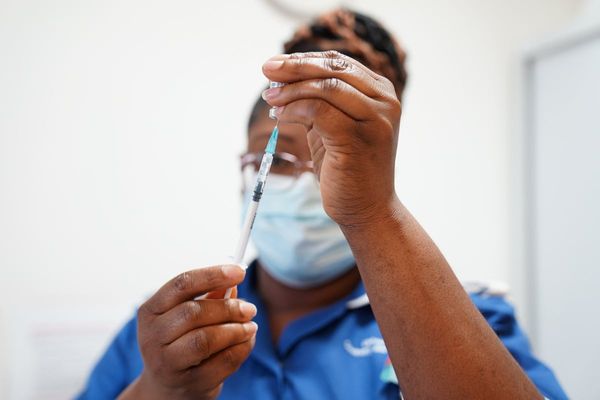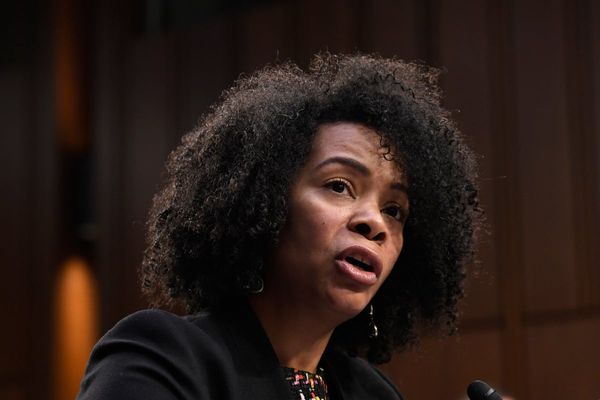
Courtesy of Olivia Pearson
Sports Illustrated and Empower Onyx are putting the spotlight on the diverse journeys of Black women across sports—from the veteran athletes, to up-and-coming stars, coaches, executives and more—in the series, Elle-evate: 100 Influential Black Women in Sports.
Jamaican sprinter Shelly-Ann Fraser-Pryce, nicknamed the “Pocket Rocket” for her five-foot frame and explosive starts, is used to making history. She was the first Caribbean, and first Jamaican woman to win the gold for 100 meters, at her very first Olympic Games in 2008. She is the most decorated 100-meter runner in Olympic history and the third-fastest woman in the world. An immensely accomplished athlete representing her island on a global stage, Fraser-Pryce is buoyed by early wisdom from her small hometown and more recent revelations from her baby boy, Zyon.
Fraser-Pryce was born and raised in Waterhouse, a district of Jamaica’s capital city Kingston, the smallest yet most populated parish on the island, which is also home to Waterhouse Stadium and some of Jamaica’s greatest footballers (Waterhouse F.C.). “It’s particular where I’m from. It’s a lot of tenement yards,” she says. “I was really just trying to survive. You know what I mean? It was just me, my mom and my two brothers. We moved a lot in the community.” She found that running resolutely affirmed her with purpose, giving her something to focus on apart from her current situation. “Stability at that young age wasn't a thing. Track was where I found that stability, because it was just something that was constant.”
The 35-year-old unwaveringly cites her mother, Maxine Simpson, as her greatest inspiration, the glowing blueprint for her entrepreneurial, resilient spirit. Simpson was a former sprinter herself, whose career never materialized. But she saw an opportunity for her daughter to make it out of Waterhouse, by focusing on her athletics and her schoolwork. “She had my little brother, so it didn’t happen for her. It was hard because as a young girl in an inner city, there are so many distractions,” Fraser-Pryce says. “My mom would always encourage me to take track to the next level, to try to get a scholarship, because she didn’t have that chance.”

Kirby Lee/USA TODAY Sports
Fraser-Pryce recalls crucial lessons from her mother that reframed her perspective and how she wanted to approach her own life. Once on a hot day in Waterhouse, her mom took the future gold medal sprinter and her two brothers for some ice cream. One of her younger brothers notoriously didn’t like dessert, and Fraser-Pryce saw an opportunity. After inhaling her own cone, she began plotting on his ice cream, all under the vigilant gaze of her mother, who pulled her aside and whispered in her ear.
Learn to satisfy, Shelly-Ann. Do not look at what anybody else is, what they have, and if you want it. Be satisfied and content with the things that you have. She came back to these words frequently, especially as she battled adversities in her sprinting career. “I had to ‘learn to satisfy.’ To learn to be content in a situation, because it's never, ever gonna be the same. Every year, every day, it’s going to be different,” she says. “You can successfully make it out. If one thing is not working, try another thing.”
In 2008, her mother’s echoing words became more relevant than ever in a bitter, then sweet moment for Fraser-Pryce—her first time heading to the Olympics. Throughout months and months of grueling mornings, sprinting through the cold 5 a.m. hills of Waterhouse with her teammates, she maintained clarity, possessed by her singular goal. “I remember working really hard. I was so committed. I was so driven for the Olympics. I would wake up at 4:30 and be out here in the dark, the first one there,” she says. “I was ready to take it to the next level.”
Though a promising sprinter, she was one of the youngest members of her team, and candidly admits that no one expected her to make it. When she did, and the realization set in that she would be competing, exhilaration and tension swirled in her head as she boarded a plane to Beijing. Just before she left, she was almost removed from the team, after another star athlete didn’t make it at all. “I was excited to represent my country; I was over the moon. At the same time, I was disappointed going into the Olympics, knowing that I made the team and they were considering pulling me out,” Fraser-Pryce recalls. “They thought I was too young and I didn’t have any experience. I felt like I had a lot of pressure on me. I had to prove that I earned my spot. I deserve to be here and I want to be here.”
It wasn’t a challenge she backed down from, and that year Fraser-Pryce went on to make Olympic history in Beijing, as the first Caribbean woman to ever win gold in the 100 meters. Not only did she take home the gold in her first race, but it was also a clean sweep for Jamaica, with her teammates Sherone Simpson and Kerron Stewart finishing right behind her, in a tie. “Winning gold and becoming the first Caribbean woman to win the title … I was blown away. I wasn't even thinking about all of that, but it just shows how important your journey is to somebody else, to a nation, to different people,” she says. “You never know the story that’s going to be told, what it’s going to mean for your country or your community.”
The rest was history—Fraser-Pryce never once took for granted the opportunity to represent the very best of her homeland. She went on to become one of four women ever to defend an Olympic 100-meter title in London 2012, and took home bronze in Rio ’16 after an injury set her back. She also took home 10 gold and two silver medals at the World Athletics Championships and was the only person to ever win four world titles in the 100 meters between ’09 and ’19.
Right after her 2016 win in Rio, Fraser-Pryce announced that she wouldn’t be defending her title at the ’17 World Championships in London, as she and her husband readied themselves for the birth of their first child. She went into labor watching the world 100-meter final on TV and gave birth to her son, Zyon, the very next day. “There were articles and people saying, Oh, you should retire. You have achieved a lot already. Maybe it’s time to just pack it up. Almost as if motherhood somehow diminishes your capabilities or makes you obsolete. But for the first time in my life, I think I was patient.”
It was scary and it was new, but motherhood provided a welcome distraction and necessary adjustments to her relentless, fast-paced lifestyle. It encouraged her to slow down, to rest, to have patience with herself. To forgive her own humanity. It gave her a new motivation, in life and especially on the track.
“After having my son, I had good meets and I had very bad meets,” she says. “But for the first time I was able to go back home, look at him, have a smile and be happy. Know that tomorrow it’s going to be good. It’s going to work. I needed that extra motivation, that extra push, that extra love. It doesn’t matter what happens on the track, because when I get off, there’s somebody that’s depending on me. I had a little boy at home that loved me regardless.”
Fast forward to July 31, 2021, when the women of Jamaica snatched their second clean sweep in the 100-meter final in Tokyo—arguably one of the greatest 100-meter races in Olympic history. With Elaine Thompson-Herah setting an Olympic record in first place with 10.61, Fraser-Pryce in second at 10.74, and Shericka Jackson in third (a personal best) at 10.76, the women took home Jamaica’s first medals of Tokyo Games.

James Lang/USA TODAY Sports
This race didn’t just make Fraser-Pryce the most decorated 100-meter runner ever—it was a rare Olympic moment when the entire winners’ podium was able to hear the same national anthem of home. As #Jamaica123 started to trend globally, user videos popped up on Twitter of the race playing on big screens over the streets and highways of Jamaica. In one video, rush-hour traffic sat at a full stop for nearly three minutes, as the traffic lights changed from red, to green, to red, to green. Drivers and pedestrians alike clamored for a better view of the nation’s star competitors, before erupting into celebration of the easy sweep.
Just days later on Aug. 6—Jamaica’s 59th anniversary of its independence from the United Kingdom—the women swept again, beating both Great Britain and the United States for gold. With the help of teammate Briana Williams, Jamaica dominated the 4X100-meter relay. Though they didn’t beat the previous world record set by the U.S., they did lock in the second-fastest time in history to set a national record.
Fraser-Pryce considers it a privilege to represent her island in front of the world as she continues to cement herself in history. “To be able to be a part of that legacy that lives on, that my son, my grandkids will know, it’s really something,” she says. “That legacy stands. It’s about the things that we did, and how we represented Jamaica.”
Currently, Fraser-Pryce is focused on July’s 2022 World Athletics Championships in Oregon, where she’ll be competing for the world record. It’s rare when her competition is close to home, and she’ll have the support of her friends and her family. She’s also focused on giving back to her home, pouring herself into her nonprofit, The Pocket Rocket Foundation. Named for her athletic moniker, the PRF provides scholarships to young Jamaican student-athletes, so they can focus on their athletics and education without the financial burden that comes with both, and hope to one day represent their country, too.
“When it comes to Jamaica, we always say we bleed black, green and gold. Here we are as Black women, and young Black women, just making sure that we put our country on the map,” Fraser-Pryce says. “A lot of our athletes are coming from nothing. We have to sacrifice so much to represent our country, to show other young girls that it doesn’t matter if we don’t have the fancy stadium or the fancy tracks that everybody else trains on. We can achieve greatness right here. Right at home.”

Naya Samuel is a contributor for Empower Onyx, a diverse multi-channel platform celebrating the stories and transformative power of sports for Black women and girls.







